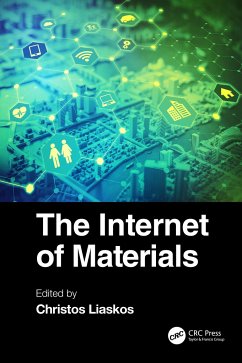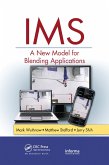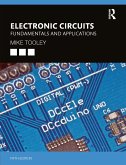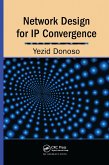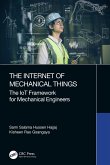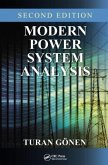The Internet of Materials
Herausgeber: Liaskos, Christos
The Internet of Materials
Herausgeber: Liaskos, Christos
- Gebundenes Buch
- Merkliste
- Auf die Merkliste
- Bewerten Bewerten
- Teilen
- Produkt teilen
- Produkterinnerung
- Produkterinnerung
The book aspires to provide the foundational knowledge for creating the Internet of Materials, enabling smart environments of any scale physical attribute â from indoors wireless communications to medical imaging equipment. We hope that the material will benefit experts and students alike.
Andere Kunden interessierten sich auch für
![IMS IMS]() Mark WuthnowIMS77,99 €
Mark WuthnowIMS77,99 €![Electronic Circuits Electronic Circuits]() Mike TooleyElectronic Circuits69,99 €
Mike TooleyElectronic Circuits69,99 €![Electric Drives Electric Drives]() Ion Boldea (Romania University Politehnica Timisoara)Electric Drives125,99 €
Ion Boldea (Romania University Politehnica Timisoara)Electric Drives125,99 €![Network Design for IP Convergence Network Design for IP Convergence]() Yezid DonosoNetwork Design for IP Convergence89,99 €
Yezid DonosoNetwork Design for IP Convergence89,99 €![The Internet of Mechanical Things The Internet of Mechanical Things]() Sami Salama Hussen HajjajThe Internet of Mechanical Things77,99 €
Sami Salama Hussen HajjajThe Internet of Mechanical Things77,99 €![Modern Power System Analysis Modern Power System Analysis]() Turan Gonen (California State University, Sacramento, USA)Modern Power System Analysis225,99 €
Turan Gonen (California State University, Sacramento, USA)Modern Power System Analysis225,99 €![Electric Power Distribution Engineering Electric Power Distribution Engineering]() Turan Gonen (California State University, Sacramento, USA)Electric Power Distribution Engineering117,99 €
Turan Gonen (California State University, Sacramento, USA)Electric Power Distribution Engineering117,99 €-
-
-
The book aspires to provide the foundational knowledge for creating the Internet of Materials, enabling smart environments of any scale physical attribute â from indoors wireless communications to medical imaging equipment. We hope that the material will benefit experts and students alike.
Hinweis: Dieser Artikel kann nur an eine deutsche Lieferadresse ausgeliefert werden.
Hinweis: Dieser Artikel kann nur an eine deutsche Lieferadresse ausgeliefert werden.
Produktdetails
- Produktdetails
- Verlag: Taylor & Francis Ltd
- Seitenzahl: 346
- Erscheinungstermin: 4. Dezember 2020
- Englisch
- Abmessung: 234mm x 156mm x 21mm
- Gewicht: 680g
- ISBN-13: 9780367457389
- ISBN-10: 0367457385
- Artikelnr.: 60018486
- Herstellerkennzeichnung
- Produktsicherheitsverantwortliche/r
- Europaallee 1
- 36244 Bad Hersfeld
- gpsr@libri.de
- Verlag: Taylor & Francis Ltd
- Seitenzahl: 346
- Erscheinungstermin: 4. Dezember 2020
- Englisch
- Abmessung: 234mm x 156mm x 21mm
- Gewicht: 680g
- ISBN-13: 9780367457389
- ISBN-10: 0367457385
- Artikelnr.: 60018486
- Herstellerkennzeichnung
- Produktsicherheitsverantwortliche/r
- Europaallee 1
- 36244 Bad Hersfeld
- gpsr@libri.de
Dr. Christos Liaskos received the Diploma in Electrical and Computer Engineering from the Aristotle University of Thessaloniki (AUTH), Greece in 2004, the MSc degree in Medical Informatics in 2008 from the Medical School, AUTH and the PhD degree in Computer Networking from the Dept. of Informatics, AUTH in 2014. He has published work in several venues, such as IEEE Transactions on: Networking, Computers, Vehicular Technology, Broadcasting, Systems Man and Cybernetics, Networks and Service Management, Communications, INFOCOM. He is currently a researcher at the Foundation of Research and Technology, Hellas (FORTH). His research interests include computer networks, security and nanotechnology, with a focus on developing nanonetwork architectures and communication protocols for future applications. Dr. Ageliki Tsioliaridou received the Diploma and PhD degrees in Electrical and Computer Engineering from the Democritus University of Thrace (DUTH), Greece, in 2004 and 2010, respectively. Her research work is mainly on the field of Quality of Service in computer networks. Additionally, her recent research interests lie in the area of nanonetworks, with specific focus on architecture, protocols, security and authorization issues. She has contributed to a number of EU, ESA and National research projects. She is currently a researcher at the Foundation of Research and Technology, Hellas (FORTH). Prof. Sotirios Ioannidis received a BSc degree in Mathematics and an MSc degree in Computer Science from the University of Crete in 1994 and 1996 respectively. In 1998 he received an MSc degree in Computer Science from the University of Rochester and in 2005 he received his PhD from the University of Pennsylvania. Ioannidis held a Research Scholar position at the Stevens Institute of Technology until 2007, and since then he is Research Director at the Institute of Computer Science of the Foundation for Research and Technology - Hellas. Since November 2017 he is a member of the European Union Agency for Network and Information Security (ENISA) Permanent Stakeholders Group (PSG). His research interests are in the area of systems, networks, and security. Ioannidis has authored more than 100 publications in international conferences and journals, as well as book chapters, including ACM CCS, ACM/IEEE ToN, USENIX ATC, NDSS, and has both chaired and served in numerous program committees in prestigious international conferences. Ioannidis is a Marie-Curie Fellow and has participated in numerous international and European projects. He has coordinated a number of European and National projects (e.g. PASS, EU-INCOOP, GANDALF, SHARCS) and is currently the project coordinator of the THREAT-ARREST, I-BiDaaS, BIO-PHOENIX, IDEAL-CITIES, CYBERSURE, and CERTCOOP European projects. Prof. Andreas Pitsillides is a Professor in the Department of Computer Science, University of Cyprus, heads NetRL, the Networks Research Laboratory he founded in 2002, and is appointed Visiting Professor at the University of the Witwatersrand (Wits), School of Electrical and Information engineering, Johannesburg, South Africa. Earlier (2014-2017) Andreas was appointed Visiting Professor at the University of Johannesburg, Department of Electrical and Electronic Engineering Science, South Africa. His broad research interests include communication networks (fixed and mobile/wireless), Nanonetworks and Software Defined Metasurfaces/Metamaterials, the Internet- and Web- of Things, Smart Spaces (Home, Grid, City), and Internet technologies and their application in Mobile e-Services, especially e-health, and security. He has a particular interest in adapting tools from various fields of applied mathematics such as adaptive non-linear control theory, computational intelligence, game theory, and recently complex systems and nature inspired techniques, to solve problems in communication networks. Published over 270 referred papers in flagship journals (e.g. IEEE, Elsevier, IFAC, Springer), international conferences and book chapters, 2 books (one edited), participated in over 30 European Commission and locally funded research projects as principal or co-principal investigator, received several awards, including best paper, presented keynotes, invited lectures at major research organizations, short courses at international conferences and short courses to industry, and serves/served on several journal and conference executive committees. Prof. Ian F. Akyildiz is currently the Ken Byers Chair Professor in Telecommunications with the School of Electrical and Computer Engineering, Director of the Broadband Wireless Networking Laboratory, and Chair of the Telecommunication Group at Georgia Institute of Technology, Atlanta, USA. Since 2011, he serves as a Consulting Chair Professor with the Department of Information Technology, King Abdulaziz University, Jeddah, Saudi Arabia, and with the Computer Science Department at the University of Cyprus since January 2017. He is a Megagrant Research Leader with the Institute for Information Transmission Problems at the Russian Academy of Sciences, in Moscow, Russia, since May 2018. His current research interests are in 5G wireless systems, nanonetworks, Terahertz band communications, and wireless sensor networks in challenged environments. He is an IEEE Fellow (1996) and an ACM Fellow (1997). He received numerous awards from the IEEE and the ACM, and many other organizations. His h-index is 115, and the total number of citations is above 105K as per Google scholar as of October 2018.
Preface
Introduction
Electromagnetic specifications and prototype designs of Software Defined
Surfaces
3.1 Electromagnetic modeling of metasurfaces
3.1.1 Unit cell, polarizability, and interaction constant
3.1.2 Impedance boundary condition
3.1.3 Sheet impedance
3.2 Metasurfaces and their functionalities compared with other sheet
materials and phased array antennas
3.2.1 Sheets of usual materials
3.2.2 Antenna arrays
3.2.3 Metasurfaces
3.2.4 Comparison of possible functionalities and advantages of metasurfaces
3.3 Tunable metasurfaces: from global tuning to software-defined
metasurfaces
3.3.1 Global tuning
3.3.1.1 Electric tuning
3.3.1.2 Magnetic tuning
3.3.1.3 Tuning by light
3.3.1.4 Thermal tuning
3.3.2 Local tuning
3.3.2.1 Switch diode
3.3.2.2 Continuous tuning varactors
3.3.2.3 Coding metasurfaces
3.3.3 Software-defined metasurfaces
3.4 Design workflow of the switch-fabric prototype
3.4.1 Design principles per functionality
3.4.1.1 Tunable perfect absorption
3.4.1.2 Tunable anomalous reflection
3.4.2 Proof-of-concept design and its performance
3.4.2.1 Tunable perfect absorption
3.4.2.2 Tunable anomalous reflection
3.4.3 Practical considerations and restrictions
3.4.3.1 Electronic package considerations from the EM aspect
3.4.3.2 Where should we position the package vertically
3.4.3.3 Linking electromagnetic and package designs
3.4.3.4 Basic unit-cell parameters
3.4.3.5 Advanced design considerations
3.4.4 Overview of the switch-fabric tunable absorber design
3.5 Electromagnetic performance of the switch-fabric design
3.5.1 Tunable perfect absorption
3.5.3 Polarization conversion
3.5.4 Electromagnetic characterization procedures
3.5.4.1 Experimental set up
3.5.4.2 Demonstration procedure
3.5.4.3 Spatial modulation of load configuration for better performance
3.6 Design of the graphene-based prototype
3.6.1 Practical considerations and design constraints
3.6.2 Graphene combined with metallic patches
3.6.3 Frequency-tunable perfect absorber
3.6.4 Switchable absorber
3.6.5 All-angle perfect absorber
3.7 Summary
Designing the Internet-of-materials interaction software
4.1 Software design considerations
4.2 The Internet of Materials software architecture
4.3 The Internet of Materials Application Programming Interface
4.3.1 General Use Case Diagram
4.3.2 The Database Diagram
4.3.2.1 Table "DoA"
4.3.2.2 Table "Polarities"
4.3.2.3 Table "SwitchStates"
4.3.2.4 Table "Physical Setup"
4.3.2.5 Table "Function Electromagnetic Profiles"
4.3.3 The Class Diagram
4.4 A novel software class: The Electromagnetic Compiler
4.4.1 A Qualitative view of the compiling process
4.4.2 Metasurface functions
4.4.3 Formal Definition of a Metasurface Configuration
4.4.4 Definition of Fitness function
4.4.5 Methods
4.5 Theoretical foundations of the Electromagnetic Compiler
4.5.1 Definitions
4.5.2 Floquet (unit-cell) analysis
4.5.3 ABSORB functionality
4.5.4 REFLECT functionality
4.5.5 POLARIZE functionality
4.5.6 STEER functionality
4.5.7 SPLIT functionality
4.5.8 Far-field scattering/radiation pattern
4.5.9 Formal definition
4.5.10 Semi-analytical calculation
4.5.11 Polarization
4.5.12 Scattered power in a lobe (solid angle cone)
4.5.13 Fitness functions per functionality
4.5.13.1 ABSORB functionality
4.5.13.2 STEER functionality
4.5.13.3 REFLECT functionality
4.5.13.4 SPLIT functionality
4.5.13.5 POLARIZE functionality
4.5.13.6 FOCUS and COLLIMATE functionalities
4.5.13.7 SCATTER functionality
4.5.13.8 ARBITRARY functionality
4.5.14 The configuration optimization process
4.6 Software aspects of the Electromagnetic Compiler
4.6.1 General Use Cases
4.6.2 Validating the compilation outcomes with measurements
4.7 Conclusion
Design of the HyperSurface networking aspects
5.1 Design Requirements of the Hypersurface Controller Network
5.2 Hypersurface Networking Components: The Hypersurface Network Controller
5.2.1 Hypersurface Controller Communication
5.3 The Hypersurface Controller Network Topology
5.3.1 Hypersurface Network Controller Addressing
5.3.2 Hypersurface Network Controller Channel Mapping
5.4 Hypersurface Controller Network Communication Protocols
5.4.1 Routing and Reporting Protocol
5.4.2 Fault-adaptive Routing
5.4.3 Workload Characterization
5.5 Evaluation of the Controller Network Design and Performance via
Simulations
5.5.1 Custom-built Simulations
5.5.2 Hypersurface Controller Network Simulator
5.5.2.1 The Hypersurface Controller Network Simulation
5.5.3 Formal Evaluation of the HSF-CN
5.5.4 HyperSurface Emulator
5.6 The Controller-Gateway communication perspective
5.6.1 Gateway functionality
5.6.1.1 Software/Firmware Design and Development
5.6.1.2 Tile Gateway Communication Interface Firmware
5.6.1.3 Error/Fault Detection
5.6.1.4 Bluetooth Mesh Firmware
5.7 The HyperSurface within control loops
5.7.1 System Model
5.7.2 The Considered Model
5.7.3 Control Algorithm
5.7.4 Estimation Algorithm
5.7.5 Performance Evaluation
5.8 Summary
Internet of Things-compliant platforms for inter-networking metamaterials
6.1 Overview
6.2 Hardware actuation approaches
6.2.1 RF switching elements
6.2.1.1 PIN Diodes
6.2.2 Controller to PIN interface
6.2.2.1 DAC
6.3 Controller communication
6.3.1 Controller to controller communication
6.3.1.1 SPI
6.3.1.2 I2C
6.3.1.3 UART
6.3.1.4 CAN
6.3.2 Controller to Server communication
6.3.2.1 Bluetooth
6.3.2.2 802.15.4
6.3.2.3 Zigbee
6.3.2.4 UWB
6.3.2.5 LORA
6.4 Controller Hardware
6.4.1 The ESP8266/ESP32
6.4.2 Arduino
6.4.3 Raspberry PI
6.4.4 BeagleBone
6.4.5 Libelium WaspMote
6.4.6 OpenMote
6.5 IoT Operating systems
6.5.1 TinyOS
6.5.2 Contiki/Contiki-NG
6.5.3 FreeRTOS
6.5.4 Android Things
6.5.5 OpenWRT
6.5.6 Raspbian
6.5.7 OpenWSN
6.6 IoT Broker
6.6.1 MQTT brokers
6.6.1.1 Mosquitto
6.6.1.2 RabbitMQ
6.6.1.3 EMQ
6.6.1.4 VerneMQ
6.7 Conclusions
Interim: Drafting a stack
The scaling laws of HyperSurfaces
8.1 The HyperSurface Scalability versus Manufacturing Technologies
8.1.1 Scaling Model
8.1.1.1 Dimensional Factors
8.1.1.2 Programming Parameters
8.1.2 Methodology
8.1.2.1 Unit Cell Model
8.1.2.2 Metasurface Model
8.1.2.3 Metasurface Coding
8.1.2.4 Performance Metrics
8.1.2.5 Validation
8.1.3 Performance Scalability
8.1.3.1 Directivity
8.1.3.2 Target Deviation
8.1.3.3 Half Power Beam Width
8.1.3.4 Side Lobe Level
8.1.4 The HyperSurface Energy Footprint, Cost and Performance
8.1.4.1 Cost and Power Models
8.1.4.2 Application-Specific Figures of Merit
8.1.4.3 Performance-Cost Analysis
8.2 The HyperSurface Data Traffic as a Scaling Concern
8.2.1 System Model
8.2.1.1 Mobility Model
8.2.1.2 Gateway Model
8.2.1.3 Embedded Controller Network
8.2.2 Evaluation Methodology
8.2.2.1 Relevant Inputs
8.2.2.2 Traffic Analysis Metrics
8.2.2.3 Walkthrough Example
8.2.3 Workload Characterization
8.2.3.1 Spatio-temporal Intensity
8.2.3.2 Reconfiguration Delay
8.2.3.3 Sensitivity Analysis
8.2.4 Indoor Mobility Scenario
8.3 Conclusions
Applications of the Internet-of-materials: Programmable wireless
environments
9.1 Deterministic wireless propagation control as a concept
9.2 Modeling, simulating and configuring PWEs - a ray-routing approach
based on graph theory
9.2.1 General Modeling and Properties of HyperSurface Functions
9.2.2 Specialized Modeling of Function Inputs/Outputs
9.2.3 Modeling Core HyperSurface Functions
9.2.4 A Graph Model for Simulating and Optimizing Programmable Wireless
Environments
9.2.5 Modeling connectivity objectives
9.2.5.1 Power transfer maximization
9.2.5.2 QoS optimization
9.2.5.3 Eavesdropping mitigation
9.2.5.4 Doppler effect mitigation
9.2.5.5 User blocking
9.3 A K-paths Approach for Multi-User Multi-Objective Environment
Configuration
9.4 Artificial Intelligence-based configuration of PWEs
9.4.0.1 Feed-forward
9.4.0.2 Back-propagation
9.5 The novel PWE potential in Communication Quality,
Cybersecurity and Wireless Power Transfer
9.5.1 Multi-User Multi-Objective Showcase
9.5.2 Doppler Effect Mitigation Showcase
9.5.3 User Capacity and Stress test
9.5.4 Evaluation of Neural Network-based PWE heuristics
9.6 Conclusion
Epilogue
Introduction
Electromagnetic specifications and prototype designs of Software Defined
Surfaces
3.1 Electromagnetic modeling of metasurfaces
3.1.1 Unit cell, polarizability, and interaction constant
3.1.2 Impedance boundary condition
3.1.3 Sheet impedance
3.2 Metasurfaces and their functionalities compared with other sheet
materials and phased array antennas
3.2.1 Sheets of usual materials
3.2.2 Antenna arrays
3.2.3 Metasurfaces
3.2.4 Comparison of possible functionalities and advantages of metasurfaces
3.3 Tunable metasurfaces: from global tuning to software-defined
metasurfaces
3.3.1 Global tuning
3.3.1.1 Electric tuning
3.3.1.2 Magnetic tuning
3.3.1.3 Tuning by light
3.3.1.4 Thermal tuning
3.3.2 Local tuning
3.3.2.1 Switch diode
3.3.2.2 Continuous tuning varactors
3.3.2.3 Coding metasurfaces
3.3.3 Software-defined metasurfaces
3.4 Design workflow of the switch-fabric prototype
3.4.1 Design principles per functionality
3.4.1.1 Tunable perfect absorption
3.4.1.2 Tunable anomalous reflection
3.4.2 Proof-of-concept design and its performance
3.4.2.1 Tunable perfect absorption
3.4.2.2 Tunable anomalous reflection
3.4.3 Practical considerations and restrictions
3.4.3.1 Electronic package considerations from the EM aspect
3.4.3.2 Where should we position the package vertically
3.4.3.3 Linking electromagnetic and package designs
3.4.3.4 Basic unit-cell parameters
3.4.3.5 Advanced design considerations
3.4.4 Overview of the switch-fabric tunable absorber design
3.5 Electromagnetic performance of the switch-fabric design
3.5.1 Tunable perfect absorption
3.5.3 Polarization conversion
3.5.4 Electromagnetic characterization procedures
3.5.4.1 Experimental set up
3.5.4.2 Demonstration procedure
3.5.4.3 Spatial modulation of load configuration for better performance
3.6 Design of the graphene-based prototype
3.6.1 Practical considerations and design constraints
3.6.2 Graphene combined with metallic patches
3.6.3 Frequency-tunable perfect absorber
3.6.4 Switchable absorber
3.6.5 All-angle perfect absorber
3.7 Summary
Designing the Internet-of-materials interaction software
4.1 Software design considerations
4.2 The Internet of Materials software architecture
4.3 The Internet of Materials Application Programming Interface
4.3.1 General Use Case Diagram
4.3.2 The Database Diagram
4.3.2.1 Table "DoA"
4.3.2.2 Table "Polarities"
4.3.2.3 Table "SwitchStates"
4.3.2.4 Table "Physical Setup"
4.3.2.5 Table "Function Electromagnetic Profiles"
4.3.3 The Class Diagram
4.4 A novel software class: The Electromagnetic Compiler
4.4.1 A Qualitative view of the compiling process
4.4.2 Metasurface functions
4.4.3 Formal Definition of a Metasurface Configuration
4.4.4 Definition of Fitness function
4.4.5 Methods
4.5 Theoretical foundations of the Electromagnetic Compiler
4.5.1 Definitions
4.5.2 Floquet (unit-cell) analysis
4.5.3 ABSORB functionality
4.5.4 REFLECT functionality
4.5.5 POLARIZE functionality
4.5.6 STEER functionality
4.5.7 SPLIT functionality
4.5.8 Far-field scattering/radiation pattern
4.5.9 Formal definition
4.5.10 Semi-analytical calculation
4.5.11 Polarization
4.5.12 Scattered power in a lobe (solid angle cone)
4.5.13 Fitness functions per functionality
4.5.13.1 ABSORB functionality
4.5.13.2 STEER functionality
4.5.13.3 REFLECT functionality
4.5.13.4 SPLIT functionality
4.5.13.5 POLARIZE functionality
4.5.13.6 FOCUS and COLLIMATE functionalities
4.5.13.7 SCATTER functionality
4.5.13.8 ARBITRARY functionality
4.5.14 The configuration optimization process
4.6 Software aspects of the Electromagnetic Compiler
4.6.1 General Use Cases
4.6.2 Validating the compilation outcomes with measurements
4.7 Conclusion
Design of the HyperSurface networking aspects
5.1 Design Requirements of the Hypersurface Controller Network
5.2 Hypersurface Networking Components: The Hypersurface Network Controller
5.2.1 Hypersurface Controller Communication
5.3 The Hypersurface Controller Network Topology
5.3.1 Hypersurface Network Controller Addressing
5.3.2 Hypersurface Network Controller Channel Mapping
5.4 Hypersurface Controller Network Communication Protocols
5.4.1 Routing and Reporting Protocol
5.4.2 Fault-adaptive Routing
5.4.3 Workload Characterization
5.5 Evaluation of the Controller Network Design and Performance via
Simulations
5.5.1 Custom-built Simulations
5.5.2 Hypersurface Controller Network Simulator
5.5.2.1 The Hypersurface Controller Network Simulation
5.5.3 Formal Evaluation of the HSF-CN
5.5.4 HyperSurface Emulator
5.6 The Controller-Gateway communication perspective
5.6.1 Gateway functionality
5.6.1.1 Software/Firmware Design and Development
5.6.1.2 Tile Gateway Communication Interface Firmware
5.6.1.3 Error/Fault Detection
5.6.1.4 Bluetooth Mesh Firmware
5.7 The HyperSurface within control loops
5.7.1 System Model
5.7.2 The Considered Model
5.7.3 Control Algorithm
5.7.4 Estimation Algorithm
5.7.5 Performance Evaluation
5.8 Summary
Internet of Things-compliant platforms for inter-networking metamaterials
6.1 Overview
6.2 Hardware actuation approaches
6.2.1 RF switching elements
6.2.1.1 PIN Diodes
6.2.2 Controller to PIN interface
6.2.2.1 DAC
6.3 Controller communication
6.3.1 Controller to controller communication
6.3.1.1 SPI
6.3.1.2 I2C
6.3.1.3 UART
6.3.1.4 CAN
6.3.2 Controller to Server communication
6.3.2.1 Bluetooth
6.3.2.2 802.15.4
6.3.2.3 Zigbee
6.3.2.4 UWB
6.3.2.5 LORA
6.4 Controller Hardware
6.4.1 The ESP8266/ESP32
6.4.2 Arduino
6.4.3 Raspberry PI
6.4.4 BeagleBone
6.4.5 Libelium WaspMote
6.4.6 OpenMote
6.5 IoT Operating systems
6.5.1 TinyOS
6.5.2 Contiki/Contiki-NG
6.5.3 FreeRTOS
6.5.4 Android Things
6.5.5 OpenWRT
6.5.6 Raspbian
6.5.7 OpenWSN
6.6 IoT Broker
6.6.1 MQTT brokers
6.6.1.1 Mosquitto
6.6.1.2 RabbitMQ
6.6.1.3 EMQ
6.6.1.4 VerneMQ
6.7 Conclusions
Interim: Drafting a stack
The scaling laws of HyperSurfaces
8.1 The HyperSurface Scalability versus Manufacturing Technologies
8.1.1 Scaling Model
8.1.1.1 Dimensional Factors
8.1.1.2 Programming Parameters
8.1.2 Methodology
8.1.2.1 Unit Cell Model
8.1.2.2 Metasurface Model
8.1.2.3 Metasurface Coding
8.1.2.4 Performance Metrics
8.1.2.5 Validation
8.1.3 Performance Scalability
8.1.3.1 Directivity
8.1.3.2 Target Deviation
8.1.3.3 Half Power Beam Width
8.1.3.4 Side Lobe Level
8.1.4 The HyperSurface Energy Footprint, Cost and Performance
8.1.4.1 Cost and Power Models
8.1.4.2 Application-Specific Figures of Merit
8.1.4.3 Performance-Cost Analysis
8.2 The HyperSurface Data Traffic as a Scaling Concern
8.2.1 System Model
8.2.1.1 Mobility Model
8.2.1.2 Gateway Model
8.2.1.3 Embedded Controller Network
8.2.2 Evaluation Methodology
8.2.2.1 Relevant Inputs
8.2.2.2 Traffic Analysis Metrics
8.2.2.3 Walkthrough Example
8.2.3 Workload Characterization
8.2.3.1 Spatio-temporal Intensity
8.2.3.2 Reconfiguration Delay
8.2.3.3 Sensitivity Analysis
8.2.4 Indoor Mobility Scenario
8.3 Conclusions
Applications of the Internet-of-materials: Programmable wireless
environments
9.1 Deterministic wireless propagation control as a concept
9.2 Modeling, simulating and configuring PWEs - a ray-routing approach
based on graph theory
9.2.1 General Modeling and Properties of HyperSurface Functions
9.2.2 Specialized Modeling of Function Inputs/Outputs
9.2.3 Modeling Core HyperSurface Functions
9.2.4 A Graph Model for Simulating and Optimizing Programmable Wireless
Environments
9.2.5 Modeling connectivity objectives
9.2.5.1 Power transfer maximization
9.2.5.2 QoS optimization
9.2.5.3 Eavesdropping mitigation
9.2.5.4 Doppler effect mitigation
9.2.5.5 User blocking
9.3 A K-paths Approach for Multi-User Multi-Objective Environment
Configuration
9.4 Artificial Intelligence-based configuration of PWEs
9.4.0.1 Feed-forward
9.4.0.2 Back-propagation
9.5 The novel PWE potential in Communication Quality,
Cybersecurity and Wireless Power Transfer
9.5.1 Multi-User Multi-Objective Showcase
9.5.2 Doppler Effect Mitigation Showcase
9.5.3 User Capacity and Stress test
9.5.4 Evaluation of Neural Network-based PWE heuristics
9.6 Conclusion
Epilogue
Preface
Introduction
Electromagnetic specifications and prototype designs of Software Defined
Surfaces
3.1 Electromagnetic modeling of metasurfaces
3.1.1 Unit cell, polarizability, and interaction constant
3.1.2 Impedance boundary condition
3.1.3 Sheet impedance
3.2 Metasurfaces and their functionalities compared with other sheet
materials and phased array antennas
3.2.1 Sheets of usual materials
3.2.2 Antenna arrays
3.2.3 Metasurfaces
3.2.4 Comparison of possible functionalities and advantages of metasurfaces
3.3 Tunable metasurfaces: from global tuning to software-defined
metasurfaces
3.3.1 Global tuning
3.3.1.1 Electric tuning
3.3.1.2 Magnetic tuning
3.3.1.3 Tuning by light
3.3.1.4 Thermal tuning
3.3.2 Local tuning
3.3.2.1 Switch diode
3.3.2.2 Continuous tuning varactors
3.3.2.3 Coding metasurfaces
3.3.3 Software-defined metasurfaces
3.4 Design workflow of the switch-fabric prototype
3.4.1 Design principles per functionality
3.4.1.1 Tunable perfect absorption
3.4.1.2 Tunable anomalous reflection
3.4.2 Proof-of-concept design and its performance
3.4.2.1 Tunable perfect absorption
3.4.2.2 Tunable anomalous reflection
3.4.3 Practical considerations and restrictions
3.4.3.1 Electronic package considerations from the EM aspect
3.4.3.2 Where should we position the package vertically
3.4.3.3 Linking electromagnetic and package designs
3.4.3.4 Basic unit-cell parameters
3.4.3.5 Advanced design considerations
3.4.4 Overview of the switch-fabric tunable absorber design
3.5 Electromagnetic performance of the switch-fabric design
3.5.1 Tunable perfect absorption
3.5.3 Polarization conversion
3.5.4 Electromagnetic characterization procedures
3.5.4.1 Experimental set up
3.5.4.2 Demonstration procedure
3.5.4.3 Spatial modulation of load configuration for better performance
3.6 Design of the graphene-based prototype
3.6.1 Practical considerations and design constraints
3.6.2 Graphene combined with metallic patches
3.6.3 Frequency-tunable perfect absorber
3.6.4 Switchable absorber
3.6.5 All-angle perfect absorber
3.7 Summary
Designing the Internet-of-materials interaction software
4.1 Software design considerations
4.2 The Internet of Materials software architecture
4.3 The Internet of Materials Application Programming Interface
4.3.1 General Use Case Diagram
4.3.2 The Database Diagram
4.3.2.1 Table "DoA"
4.3.2.2 Table "Polarities"
4.3.2.3 Table "SwitchStates"
4.3.2.4 Table "Physical Setup"
4.3.2.5 Table "Function Electromagnetic Profiles"
4.3.3 The Class Diagram
4.4 A novel software class: The Electromagnetic Compiler
4.4.1 A Qualitative view of the compiling process
4.4.2 Metasurface functions
4.4.3 Formal Definition of a Metasurface Configuration
4.4.4 Definition of Fitness function
4.4.5 Methods
4.5 Theoretical foundations of the Electromagnetic Compiler
4.5.1 Definitions
4.5.2 Floquet (unit-cell) analysis
4.5.3 ABSORB functionality
4.5.4 REFLECT functionality
4.5.5 POLARIZE functionality
4.5.6 STEER functionality
4.5.7 SPLIT functionality
4.5.8 Far-field scattering/radiation pattern
4.5.9 Formal definition
4.5.10 Semi-analytical calculation
4.5.11 Polarization
4.5.12 Scattered power in a lobe (solid angle cone)
4.5.13 Fitness functions per functionality
4.5.13.1 ABSORB functionality
4.5.13.2 STEER functionality
4.5.13.3 REFLECT functionality
4.5.13.4 SPLIT functionality
4.5.13.5 POLARIZE functionality
4.5.13.6 FOCUS and COLLIMATE functionalities
4.5.13.7 SCATTER functionality
4.5.13.8 ARBITRARY functionality
4.5.14 The configuration optimization process
4.6 Software aspects of the Electromagnetic Compiler
4.6.1 General Use Cases
4.6.2 Validating the compilation outcomes with measurements
4.7 Conclusion
Design of the HyperSurface networking aspects
5.1 Design Requirements of the Hypersurface Controller Network
5.2 Hypersurface Networking Components: The Hypersurface Network Controller
5.2.1 Hypersurface Controller Communication
5.3 The Hypersurface Controller Network Topology
5.3.1 Hypersurface Network Controller Addressing
5.3.2 Hypersurface Network Controller Channel Mapping
5.4 Hypersurface Controller Network Communication Protocols
5.4.1 Routing and Reporting Protocol
5.4.2 Fault-adaptive Routing
5.4.3 Workload Characterization
5.5 Evaluation of the Controller Network Design and Performance via
Simulations
5.5.1 Custom-built Simulations
5.5.2 Hypersurface Controller Network Simulator
5.5.2.1 The Hypersurface Controller Network Simulation
5.5.3 Formal Evaluation of the HSF-CN
5.5.4 HyperSurface Emulator
5.6 The Controller-Gateway communication perspective
5.6.1 Gateway functionality
5.6.1.1 Software/Firmware Design and Development
5.6.1.2 Tile Gateway Communication Interface Firmware
5.6.1.3 Error/Fault Detection
5.6.1.4 Bluetooth Mesh Firmware
5.7 The HyperSurface within control loops
5.7.1 System Model
5.7.2 The Considered Model
5.7.3 Control Algorithm
5.7.4 Estimation Algorithm
5.7.5 Performance Evaluation
5.8 Summary
Internet of Things-compliant platforms for inter-networking metamaterials
6.1 Overview
6.2 Hardware actuation approaches
6.2.1 RF switching elements
6.2.1.1 PIN Diodes
6.2.2 Controller to PIN interface
6.2.2.1 DAC
6.3 Controller communication
6.3.1 Controller to controller communication
6.3.1.1 SPI
6.3.1.2 I2C
6.3.1.3 UART
6.3.1.4 CAN
6.3.2 Controller to Server communication
6.3.2.1 Bluetooth
6.3.2.2 802.15.4
6.3.2.3 Zigbee
6.3.2.4 UWB
6.3.2.5 LORA
6.4 Controller Hardware
6.4.1 The ESP8266/ESP32
6.4.2 Arduino
6.4.3 Raspberry PI
6.4.4 BeagleBone
6.4.5 Libelium WaspMote
6.4.6 OpenMote
6.5 IoT Operating systems
6.5.1 TinyOS
6.5.2 Contiki/Contiki-NG
6.5.3 FreeRTOS
6.5.4 Android Things
6.5.5 OpenWRT
6.5.6 Raspbian
6.5.7 OpenWSN
6.6 IoT Broker
6.6.1 MQTT brokers
6.6.1.1 Mosquitto
6.6.1.2 RabbitMQ
6.6.1.3 EMQ
6.6.1.4 VerneMQ
6.7 Conclusions
Interim: Drafting a stack
The scaling laws of HyperSurfaces
8.1 The HyperSurface Scalability versus Manufacturing Technologies
8.1.1 Scaling Model
8.1.1.1 Dimensional Factors
8.1.1.2 Programming Parameters
8.1.2 Methodology
8.1.2.1 Unit Cell Model
8.1.2.2 Metasurface Model
8.1.2.3 Metasurface Coding
8.1.2.4 Performance Metrics
8.1.2.5 Validation
8.1.3 Performance Scalability
8.1.3.1 Directivity
8.1.3.2 Target Deviation
8.1.3.3 Half Power Beam Width
8.1.3.4 Side Lobe Level
8.1.4 The HyperSurface Energy Footprint, Cost and Performance
8.1.4.1 Cost and Power Models
8.1.4.2 Application-Specific Figures of Merit
8.1.4.3 Performance-Cost Analysis
8.2 The HyperSurface Data Traffic as a Scaling Concern
8.2.1 System Model
8.2.1.1 Mobility Model
8.2.1.2 Gateway Model
8.2.1.3 Embedded Controller Network
8.2.2 Evaluation Methodology
8.2.2.1 Relevant Inputs
8.2.2.2 Traffic Analysis Metrics
8.2.2.3 Walkthrough Example
8.2.3 Workload Characterization
8.2.3.1 Spatio-temporal Intensity
8.2.3.2 Reconfiguration Delay
8.2.3.3 Sensitivity Analysis
8.2.4 Indoor Mobility Scenario
8.3 Conclusions
Applications of the Internet-of-materials: Programmable wireless
environments
9.1 Deterministic wireless propagation control as a concept
9.2 Modeling, simulating and configuring PWEs - a ray-routing approach
based on graph theory
9.2.1 General Modeling and Properties of HyperSurface Functions
9.2.2 Specialized Modeling of Function Inputs/Outputs
9.2.3 Modeling Core HyperSurface Functions
9.2.4 A Graph Model for Simulating and Optimizing Programmable Wireless
Environments
9.2.5 Modeling connectivity objectives
9.2.5.1 Power transfer maximization
9.2.5.2 QoS optimization
9.2.5.3 Eavesdropping mitigation
9.2.5.4 Doppler effect mitigation
9.2.5.5 User blocking
9.3 A K-paths Approach for Multi-User Multi-Objective Environment
Configuration
9.4 Artificial Intelligence-based configuration of PWEs
9.4.0.1 Feed-forward
9.4.0.2 Back-propagation
9.5 The novel PWE potential in Communication Quality,
Cybersecurity and Wireless Power Transfer
9.5.1 Multi-User Multi-Objective Showcase
9.5.2 Doppler Effect Mitigation Showcase
9.5.3 User Capacity and Stress test
9.5.4 Evaluation of Neural Network-based PWE heuristics
9.6 Conclusion
Epilogue
Introduction
Electromagnetic specifications and prototype designs of Software Defined
Surfaces
3.1 Electromagnetic modeling of metasurfaces
3.1.1 Unit cell, polarizability, and interaction constant
3.1.2 Impedance boundary condition
3.1.3 Sheet impedance
3.2 Metasurfaces and their functionalities compared with other sheet
materials and phased array antennas
3.2.1 Sheets of usual materials
3.2.2 Antenna arrays
3.2.3 Metasurfaces
3.2.4 Comparison of possible functionalities and advantages of metasurfaces
3.3 Tunable metasurfaces: from global tuning to software-defined
metasurfaces
3.3.1 Global tuning
3.3.1.1 Electric tuning
3.3.1.2 Magnetic tuning
3.3.1.3 Tuning by light
3.3.1.4 Thermal tuning
3.3.2 Local tuning
3.3.2.1 Switch diode
3.3.2.2 Continuous tuning varactors
3.3.2.3 Coding metasurfaces
3.3.3 Software-defined metasurfaces
3.4 Design workflow of the switch-fabric prototype
3.4.1 Design principles per functionality
3.4.1.1 Tunable perfect absorption
3.4.1.2 Tunable anomalous reflection
3.4.2 Proof-of-concept design and its performance
3.4.2.1 Tunable perfect absorption
3.4.2.2 Tunable anomalous reflection
3.4.3 Practical considerations and restrictions
3.4.3.1 Electronic package considerations from the EM aspect
3.4.3.2 Where should we position the package vertically
3.4.3.3 Linking electromagnetic and package designs
3.4.3.4 Basic unit-cell parameters
3.4.3.5 Advanced design considerations
3.4.4 Overview of the switch-fabric tunable absorber design
3.5 Electromagnetic performance of the switch-fabric design
3.5.1 Tunable perfect absorption
3.5.3 Polarization conversion
3.5.4 Electromagnetic characterization procedures
3.5.4.1 Experimental set up
3.5.4.2 Demonstration procedure
3.5.4.3 Spatial modulation of load configuration for better performance
3.6 Design of the graphene-based prototype
3.6.1 Practical considerations and design constraints
3.6.2 Graphene combined with metallic patches
3.6.3 Frequency-tunable perfect absorber
3.6.4 Switchable absorber
3.6.5 All-angle perfect absorber
3.7 Summary
Designing the Internet-of-materials interaction software
4.1 Software design considerations
4.2 The Internet of Materials software architecture
4.3 The Internet of Materials Application Programming Interface
4.3.1 General Use Case Diagram
4.3.2 The Database Diagram
4.3.2.1 Table "DoA"
4.3.2.2 Table "Polarities"
4.3.2.3 Table "SwitchStates"
4.3.2.4 Table "Physical Setup"
4.3.2.5 Table "Function Electromagnetic Profiles"
4.3.3 The Class Diagram
4.4 A novel software class: The Electromagnetic Compiler
4.4.1 A Qualitative view of the compiling process
4.4.2 Metasurface functions
4.4.3 Formal Definition of a Metasurface Configuration
4.4.4 Definition of Fitness function
4.4.5 Methods
4.5 Theoretical foundations of the Electromagnetic Compiler
4.5.1 Definitions
4.5.2 Floquet (unit-cell) analysis
4.5.3 ABSORB functionality
4.5.4 REFLECT functionality
4.5.5 POLARIZE functionality
4.5.6 STEER functionality
4.5.7 SPLIT functionality
4.5.8 Far-field scattering/radiation pattern
4.5.9 Formal definition
4.5.10 Semi-analytical calculation
4.5.11 Polarization
4.5.12 Scattered power in a lobe (solid angle cone)
4.5.13 Fitness functions per functionality
4.5.13.1 ABSORB functionality
4.5.13.2 STEER functionality
4.5.13.3 REFLECT functionality
4.5.13.4 SPLIT functionality
4.5.13.5 POLARIZE functionality
4.5.13.6 FOCUS and COLLIMATE functionalities
4.5.13.7 SCATTER functionality
4.5.13.8 ARBITRARY functionality
4.5.14 The configuration optimization process
4.6 Software aspects of the Electromagnetic Compiler
4.6.1 General Use Cases
4.6.2 Validating the compilation outcomes with measurements
4.7 Conclusion
Design of the HyperSurface networking aspects
5.1 Design Requirements of the Hypersurface Controller Network
5.2 Hypersurface Networking Components: The Hypersurface Network Controller
5.2.1 Hypersurface Controller Communication
5.3 The Hypersurface Controller Network Topology
5.3.1 Hypersurface Network Controller Addressing
5.3.2 Hypersurface Network Controller Channel Mapping
5.4 Hypersurface Controller Network Communication Protocols
5.4.1 Routing and Reporting Protocol
5.4.2 Fault-adaptive Routing
5.4.3 Workload Characterization
5.5 Evaluation of the Controller Network Design and Performance via
Simulations
5.5.1 Custom-built Simulations
5.5.2 Hypersurface Controller Network Simulator
5.5.2.1 The Hypersurface Controller Network Simulation
5.5.3 Formal Evaluation of the HSF-CN
5.5.4 HyperSurface Emulator
5.6 The Controller-Gateway communication perspective
5.6.1 Gateway functionality
5.6.1.1 Software/Firmware Design and Development
5.6.1.2 Tile Gateway Communication Interface Firmware
5.6.1.3 Error/Fault Detection
5.6.1.4 Bluetooth Mesh Firmware
5.7 The HyperSurface within control loops
5.7.1 System Model
5.7.2 The Considered Model
5.7.3 Control Algorithm
5.7.4 Estimation Algorithm
5.7.5 Performance Evaluation
5.8 Summary
Internet of Things-compliant platforms for inter-networking metamaterials
6.1 Overview
6.2 Hardware actuation approaches
6.2.1 RF switching elements
6.2.1.1 PIN Diodes
6.2.2 Controller to PIN interface
6.2.2.1 DAC
6.3 Controller communication
6.3.1 Controller to controller communication
6.3.1.1 SPI
6.3.1.2 I2C
6.3.1.3 UART
6.3.1.4 CAN
6.3.2 Controller to Server communication
6.3.2.1 Bluetooth
6.3.2.2 802.15.4
6.3.2.3 Zigbee
6.3.2.4 UWB
6.3.2.5 LORA
6.4 Controller Hardware
6.4.1 The ESP8266/ESP32
6.4.2 Arduino
6.4.3 Raspberry PI
6.4.4 BeagleBone
6.4.5 Libelium WaspMote
6.4.6 OpenMote
6.5 IoT Operating systems
6.5.1 TinyOS
6.5.2 Contiki/Contiki-NG
6.5.3 FreeRTOS
6.5.4 Android Things
6.5.5 OpenWRT
6.5.6 Raspbian
6.5.7 OpenWSN
6.6 IoT Broker
6.6.1 MQTT brokers
6.6.1.1 Mosquitto
6.6.1.2 RabbitMQ
6.6.1.3 EMQ
6.6.1.4 VerneMQ
6.7 Conclusions
Interim: Drafting a stack
The scaling laws of HyperSurfaces
8.1 The HyperSurface Scalability versus Manufacturing Technologies
8.1.1 Scaling Model
8.1.1.1 Dimensional Factors
8.1.1.2 Programming Parameters
8.1.2 Methodology
8.1.2.1 Unit Cell Model
8.1.2.2 Metasurface Model
8.1.2.3 Metasurface Coding
8.1.2.4 Performance Metrics
8.1.2.5 Validation
8.1.3 Performance Scalability
8.1.3.1 Directivity
8.1.3.2 Target Deviation
8.1.3.3 Half Power Beam Width
8.1.3.4 Side Lobe Level
8.1.4 The HyperSurface Energy Footprint, Cost and Performance
8.1.4.1 Cost and Power Models
8.1.4.2 Application-Specific Figures of Merit
8.1.4.3 Performance-Cost Analysis
8.2 The HyperSurface Data Traffic as a Scaling Concern
8.2.1 System Model
8.2.1.1 Mobility Model
8.2.1.2 Gateway Model
8.2.1.3 Embedded Controller Network
8.2.2 Evaluation Methodology
8.2.2.1 Relevant Inputs
8.2.2.2 Traffic Analysis Metrics
8.2.2.3 Walkthrough Example
8.2.3 Workload Characterization
8.2.3.1 Spatio-temporal Intensity
8.2.3.2 Reconfiguration Delay
8.2.3.3 Sensitivity Analysis
8.2.4 Indoor Mobility Scenario
8.3 Conclusions
Applications of the Internet-of-materials: Programmable wireless
environments
9.1 Deterministic wireless propagation control as a concept
9.2 Modeling, simulating and configuring PWEs - a ray-routing approach
based on graph theory
9.2.1 General Modeling and Properties of HyperSurface Functions
9.2.2 Specialized Modeling of Function Inputs/Outputs
9.2.3 Modeling Core HyperSurface Functions
9.2.4 A Graph Model for Simulating and Optimizing Programmable Wireless
Environments
9.2.5 Modeling connectivity objectives
9.2.5.1 Power transfer maximization
9.2.5.2 QoS optimization
9.2.5.3 Eavesdropping mitigation
9.2.5.4 Doppler effect mitigation
9.2.5.5 User blocking
9.3 A K-paths Approach for Multi-User Multi-Objective Environment
Configuration
9.4 Artificial Intelligence-based configuration of PWEs
9.4.0.1 Feed-forward
9.4.0.2 Back-propagation
9.5 The novel PWE potential in Communication Quality,
Cybersecurity and Wireless Power Transfer
9.5.1 Multi-User Multi-Objective Showcase
9.5.2 Doppler Effect Mitigation Showcase
9.5.3 User Capacity and Stress test
9.5.4 Evaluation of Neural Network-based PWE heuristics
9.6 Conclusion
Epilogue

